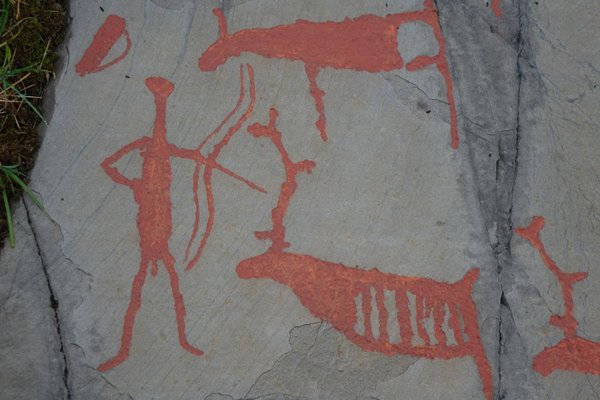Norway
Rock Art of Alta
The Rock Art of Alta consists of more than 6,000 rock carvings and paintings that show aspects of life, the environment and the activities of hunter-gatherer societies in the Arctic in prehistoric times.
The rock art is found on five separate sites along Altafjord. The earliest carvings in the area date from around 5,000 BCE. The wide variety of imagery shows a culture of hunter-gatherers that was able to control herds of reindeer, was adept at boat building and fishing and practiced shamanistic rituals involving bear worship and other venerated animals.
Community Perspective: located at an atmospheric location way inside the Arctic Circle, with a well-equipped visitor center at Hjemmeluft (the only location officially open to visitors) 4km outside of Alta town.
Site Info
Official Information
- Full Name
- Rock Art of Alta (ID: 352)
- Country
- Norway
- Status
-
Inscribed 1985
Site history
History of Rock Art of Alta
- 2006: Name change
- From "Rock Drawings of Alta" to "Rock Art of Alta"
- 1985: Inscribed
- Inscribed
- Type
- Cultural
- Criteria
- iii
Links
- UNESCO
- whc.unesco.org
- Official
-
- alta.museum.no — Alta museum
- Related
-
- rockartscandinavia.com — Article by Rock Art of Scandinavia
- per-storemyr.net — On the conservation of the prehistoric rock art at Alta
- donsmaps.com — Personal site on "Norwegan Rock Art". Lots of photos of Alta carving. Also of the museum
All Links
UNESCO.org
- whc.unesco.org — whc.unesco.org/
Official Website
- alta.museum.no — Alta museum
Related Resources
- rockartscandinavia.com — Article by Rock Art of Scandinavia
- per-storemyr.net — On the conservation of the prehistoric rock art at Alta
- donsmaps.com — Personal site on "Norwegan Rock Art". Lots of photos of Alta carving. Also of the museum
- en.wikipedia.org — Wikipedia
- altarockart.no — Map showing all the different locations and rock art
- duo.uio.no — Study of boat figures in Alta rock art
News Article
- April 21, 2021 thelocal.no — Sewage washes ashore at Alta
Community Information
- Community Category
- Archaeological site: Rock Art
Travel Information
Recent Connections
-
Perfect Inscriptions
1985 -
Full White Nights
-
Depicted in Mizielinska Maps
Rock carvings at Hjemmeluft AltaSee i…
Connections of Rock Art of Alta
- Geography
-
-
Full White Nights
-
Atlantic Ocean
In the Norwegian Sea (a marginal sea in the North Atlantic Ocean) -
Arctic
-
Fjords
Located in Alta Fjords -
Isostatic Rebound
The rock art is further away from the sea than when carved. -
Lapland
-
- Trivia
-
-
Depicted in Mizielinska Maps
Rock carvings at Hjemmeluft AltaSee i.pinimg.com
-
- World Heritage Process
-
-
Perfect Inscriptions
1985 -
Inscribed on a single criterion only
iii. to bear a unique or at least exceptional testimony to a cultural tradition or to a civilization which is living or which has disappeared
-
- Human Activity
-
-
Petroglyphs
-
Hunter-gatherers
More rock art made by hunter-gatherers is found in Alta than anywhere else in northern Europe. (official description) -
Pictographs
-
- Constructions
- WHS on Other Lists
-
-
European Museum of the Year Award
Alta Museum, Alta (1993)
-
- Timeline
- Science and Technology
-
-
Recently discovered
1972
-
- WHS Names
-
-
Name changes
rock drawings changed to rock art 2006
-
News
- thelocal.no 04/21/2021
- Sewage washes ashore at Alta
Recent Visitors
Visitors of Rock Art of Alta
- Alexander Lehmann
- ALS
- A. Mehmet Haksever
- Ana Lozano
- Anna Wludarska
- Argo
- Artur Anuszewski
- Ask Gudmundsen
- Atila Ege
- Bamse
- Bin
- Birgitte Sørensen
- Bram de Bruin
- Cheryl
- Christer Sundberg
- Claire Bradshaw
- Clyde
- Daniel Chazad
- Dan Pettigrew
- Dimitar Krastev
- DonQuijote
- DouglasR
- Elizabeth Gehrman
- Ellen Nielsen
- Els Slots
- Erik Jelinek
- Eva Kisgyorgy
- Feldhase
- Filip Murlak
- George Gdanski
- Gernot
- Harald T.
- Hdwilsonau
- Iain Jackson
- Ivan Rucek
- janem
- Janos
- Jan-Willem
- Jarek Pokrzywnicki
- Jasam
- Jay T
- Joel on the Road
- Jonas Hagung
- Jonas Kremer
- Jonas Martinsson
- Karito Vies
- Knut
- Kurt Lauer
- Luboang
- Luis Filipe Gaspar
- Maciej Gil
- Mahuhe
- Maja
- Martin
- Martina Rúčková
- Mikko
- Milan Jirasek
- MMM
- MoPython
- nan
- Nihal Ege
- Olli-Pekka Turunen
- Patrik
- Peter Lööv
- Petteri
- Philipp Peterer
- Ralf Regele
- Randi Thomsen
- Roger Ourset
- Shandos Cleaver
- Slavi
- Solivagant
- Stijn
- Svein Elias
- Tatiana Nikulnikova
- Thomas Buechler
- Tom Flaten
- Truls Brekke
- Tsunami
- WalGra
- Walter
- Wimmy
- Wojciech Fedoruk
- Zizmondka
- Zoë Sheng
Community Reviews
Show full reviews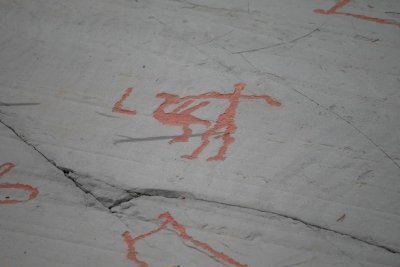
Alta has the second highest rating of all Norwegian sites. For me, it's a nice site, but not a truly great one. The great thing is to see how far early humans went and in what remote corners of the world we settled. But that doesn't really relate to the quality of the rock art. Personally, I enjoyed the rock art in Tanum or in Valcamonica better.
Speaking of Tanum, the use of paint to highlight the rock carvings has come under scrutiny. At least, in Alta they have decided to reduce paint, so only a limited set of rock art is painted nowadays.
Getting There
Alta itself is easiest reached by plane. There are several international connections, especially in winter to see the northern lights. I flew in from Tromso and flew out the same day to Oslo. Unfortunately, there are no left luggage facilities at the airport, so I ended up carrying it all day.
Alternatively, there is a almost daily 6h bus ride to Tromso. Under normal (pre Corona circumstances) I would assume you can also continue to Sweden and Finland.
From Alta airport, you can catch an hourly bus to the Alta Museum. Near Alta airport is also another location, but you would be well served to contact our resident rock art aficionado Samuel for details.
While You Are There
If you have some time to kill, you can hike Lille Raipas, a Struve site. Key problem is that …
Keep reading 0 comments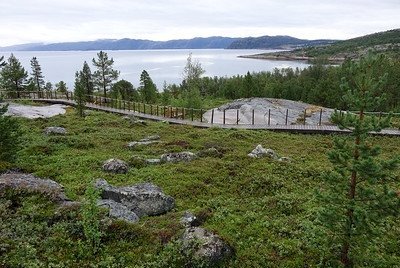
The city of Alta is the highest up north that I have ever been – 80km closer to the North Pole than my previous record, Greenland’s Ilulissat. I had come just for the day to see its Rock Art – fly in on Friday evening, fly out Sunday morning. I made a half-hearted attempt of visiting Lille Raipas as well, one of the Struve sites on a hill just 5km out of town. But it rained for most of my stay in Alta so hiking was out of the question.
Alta’s Rock Art - consisting of 4 locations with carvings and 1 with paintings - has been ‘discovered’ relatively recently. In 1966 the rock paintings were found at Transfarelvdalen, and the rock carvings followed between 1973 and 1978. The sites were inscribed on the World Heritage List only 7 years later – it makes one wonder why so quickly before the dust had settled so to speak.
Much more carvings in the same areas have been discovered since. Conservation practices in this harsh landscape have also evolved a lot: they now regularly ‘clean’ the rocks with alcohol to avoid overgrowth of them by lichen (they apparently did not do that yet in 1987, when Solivagant visited). There wasn’t a management plan until the year 2000, sites those days got in because of a certain Wow-factor I guess.
Only the site at Hjemmeluft is open to tourists, that's where also the Alta Museum is located. Here I paid …
Keep reading 0 comments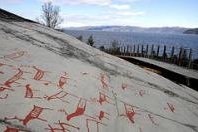
I visited this WHS in May 2010. It is quite remote, close to the Arctic Circle and still cold although there was the midnight sun when I went there. However, you'll be rewarded for your perseverance if you visit this place. The snow-capped mountains and sea form an idyllic background to the numerous rock carvings at Alta. The visitor centre is very well organised with valuable information and a much needed cup of hot chocolate after visiting the site.
Keep reading 0 comments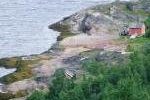
I enjoyed visiting the rock art with its coloring as it brought out the designs so clearly (compared to those in the Coa Valley, Portugal). The town of Alta is no WHS, but I found the surrounding landscape interesting and varied; rural Lapland with Sami villages towards Hammerfest, rocky gorges followed by tundra towards Finland, and coastal fiord scenery west to Tromso. And I found friendly Nowegians and Finns operating bus services to all these places.
Within Alta there is a local bus service linking the various parts of town, but not on Sundays, so I had to walk from the Sentrum to Hjemmeluft to visit the museum and rock engravings.
Keep reading 0 comments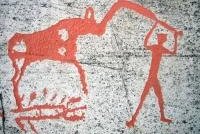
The town of Alta is not what-so-ever worth a detour. Spread out over 5 km with not less than three centres it could certainly pose as the Norwegian equivalent of one of those remote villages in an American road movie where the hero ends up in after having taken the wrong turn on the highway and gets tangled up in a weird story.
Not that I had any bad experiences in Alta but it just was not my kind of town. I also understood that the people living through the long and cold winters up there actually get a tax deduction for their heroism. Bless them all...
The rock carvings on the other hand, are worth a detour! If you happen to be in the neighbourhood, start with the excellent museum, café and souvenir shop all-in-onet before you embark on a long walk pass the many carvings. Some of them are over 9000 years old and once made by the Komsa culture back in the stone- and bronze age. And there are thousands of them...boats, reindeers, bears, fish, birds, elks, women and men, children, hunting scenes in an endless row. And its all up to your own imagination what they really means and tells. No one has really managed to explain them fully.
Keep reading 0 comments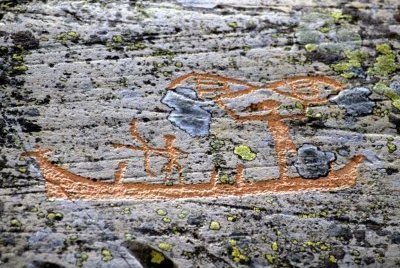
There are (at least?) 4 different WHS solely devoted to prehistoric rock carvings – Alta (Norway), Valcamonica (Italy), Tanum (Sweden) and Coa Valley (Portugal)- Bhimbetka in India I think is all rock painting rather than petroglyphs. I have been lucky enough to visit the first 3(and some others – for instance those at Cholton Ata on the Kyrgyzstan Tentative list). I am no expert on the subject (Have a look at http://rupestre.net/ for an entrée to the world of Rock art) and would not attempt to judge between them on grounds of artistic merit or historical significance – all are worth visiting but perhaps the site at Alta is the most atmospheric. The carvings overlook Alta fjord - way inside the Arctic Circle. If you have driven here from Southern Norway you have come a long long way – and it feels it. Just driving round this enormous fjord on the way to the North Cape is a half day drive!
The Norwegians (as have the Swedes) have decided to highlight the carvings with a dye (the Italians have not) this makes them clear and easy to see. All are close together on a series of ice-smoothed rocks. Apparently they date from around 4200 – 500BCE. It is nice to think of ancient peoples passing the time by recording their daily lives and beliefs whilst looking out over that same fjord view which even today shows few signs of modern life apart from a few farmsteads (although the sea …
Keep reading 0 comments
